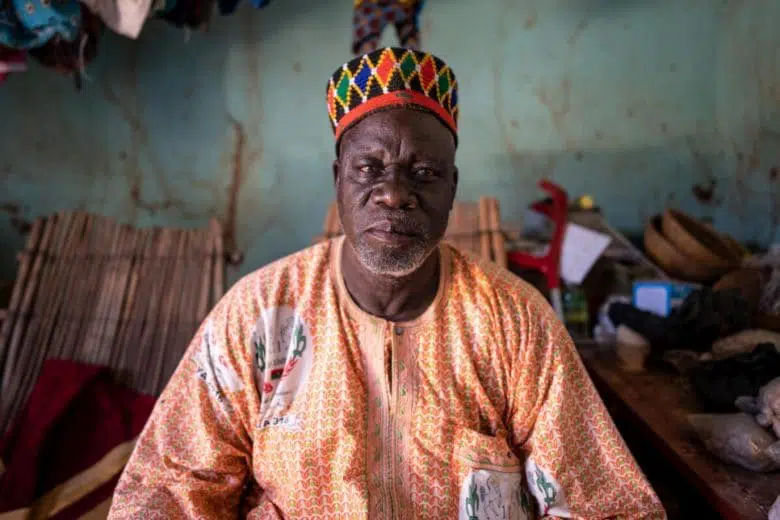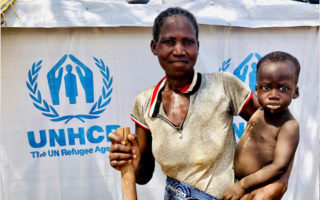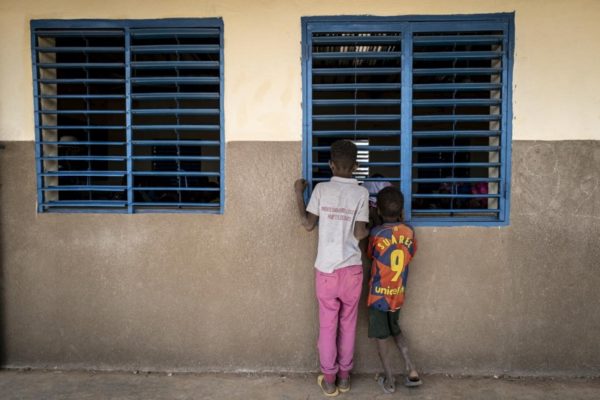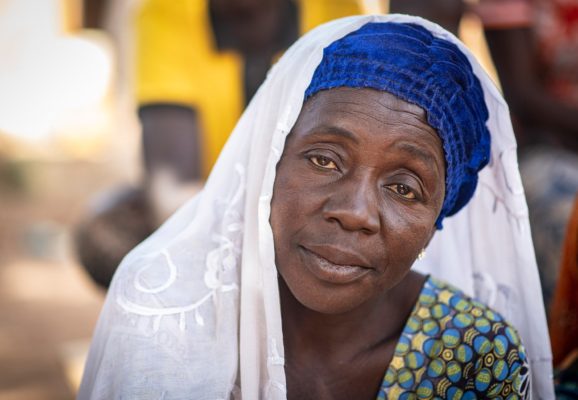
Community leader Diambendi Madiega, known by locals as ‘Elephant Chief’, at his home in Kaya, Burkina Faso. © UNHCR/Nana Kofi Acquah
Amid the world’s fastest-growing displacement crisis, two community mobilizers helping people fleeing violence have been named UNHCR Nansen Refugee Award regional winners for Africa.
By Edith Champagne and Selim Meddeb in Kaya and Dori, Burkina Faso
In early 2019, one or two newcomers each day began appearing on the dusty road leading into Bollé – a community on the outskirts of Kaya, capital of Burkina Faso’s Centre-North Region – desperately seeking help after fleeing attacks by armed groups and national forces further north near the country’s border with Mali.
Last year, however, as the attacks to the north increased and insecurity spread, what began as a trickle of displacement became a steady flow. Unsure what to do with the scores of impoverished people arriving every day, the community turned to Diambendi Madiega for answers.
“At that time the people began arriving in very big numbers in just a short period of time,” Madiega explained. “If you took the road leading [north], you would never stop meeting people coming here. It reached a point when I was overwhelmed.”
Long-regarded as a bastion of stability in Africa’s volatile Sahel region, Burkina Faso is currently grappling with the world’s fastest-growing displacement crisis. In response to frequent and deadly attacks on civilians and security forces, more than 1.4 million Burkinabè have been driven from their homes over the past two years, including at least 350,000 since the start of 2021.
Madiega, 67, is instantly recognizable by the stick he leans on to walk following a motorcycle accident, and the brightly patterned hat atop his tall frame that marks him out as the community’s leader. Among the locals he is affectionately referred to as “Naaba Wogbo”, or Elephant Chief.
With so many arriving with nothing besides a few personal possessions, Madiega felt a responsibility to help. He bought provisions to stave off hunger and opened his large backyard to displaced families, who built temporary shelters there to protect themselves from the elements. When the yard quickly filled up, he directed hundreds more to his nearby field.
Before long he was hosting and feeding some 2,500 people, but more continued to arrive. With no more land of his own to offer, Madiega set about convincing 300 others in the community to take people in.
“I asked for their land to install two or three tents, and they agreed,” he explained. “They are aware that if the current situation continues unresolved, in the future they could also find themselves in the same situation. There is no distinction between us.
While Madiega was marshalling his own community’s resources, a near identical scenario was playing out 170 kilometres to the northeast in Dori, near the country’s volatile border area with Mali and Niger that in recent years has become a hotspot for attacks and intimidation by armed groups.
As the town’s population grew by a fifth in just two years with the arrival of 35,000 displaced people, dozens would gather each day outside the house of Roukiatou Maiga.
The unassuming descendant of one of the region’s royal families, Maiga, 55, was born with a stubborn streak that led her to defy convention and her family’s wishes to marry the man she loved.
“My parents wanted me to marry someone from my own ethnic group, but I said ‘no, it’s him that I want’,” Maiga explained. “It wasn’t easy… It took time for my parents to accept.”
The experience taught her to look beyond a person’s ethnicity. “I want to show that all ethnicities can live together in peace. That’s why I started helping the displaced.”
People crowd into her sun-baked courtyard looking for her help with food, temporary shelter, and practical advice on how to register for assistance from UN agencies and other partners.
Maiga is particularly attentive to the needs of women and children who make up more than half of Burkina Faso’s displaced population. Many of them have witnessed violence, including the killing of family and neighbours.
“If a woman can move forward, then so does her community…”
As well as establishing an agricultural cooperative to provide a living for displaced and local women, she also takes the time to sit with new arrivals and listen to their stories, reaching out a hand in comfort as they talk.
“Many here have had extremely difficult experiences, and many have psychological problems,” Maiga said. “For me, if a woman can move forward, then so does her community and the whole country with her.”
Fatoumata Diallo arrived in Dori a year ago and stayed with Maiga until she received her own shelter from UNHCR, the UN Refugee Agency. “She welcomed us, listened to us, helped us,” Diallo said. “Now she is like a mother to us.”
For their unswerving dedication to helping internally displaced people in Burkina Faso, Maiga and Madiega have been chosen as regional co-winners for Africa of UNHCR’s 2021 Nansen Refugee Award.
Named after Norwegian explorer and humanitarian Fridtjof Nansen, the first High Commissioner for Refugees and Nobel Prize winner, the prestigious annual prize aims to honour those who have gone to extraordinary lengths to help forcibly displaced or stateless people.
“It shows we are all the same people; we are all Burkinabè”
On learning he would receive the award, Madiega expressed personal joy but also deep pride in the way his neighbours had come together to help their compatriots. “I am very happy for what this community has done. It shows we are all the same people; we are all Burkinabè.”
Maiga described how her work with displaced people had given her life new meaning but expressed hope that her help would one day no longer be needed.
Subscribe to UNHCR’s mailing list
“I’ve experienced so much helping people and working as a humanitarian that it’s become my life, my passion,” she said. “My wish for the displaced is that they can return, that God will bring them back to their villages in good health, and that peace will prevail in Burkina Faso.”
Originally published by UNHCR on 29 September 2021.





